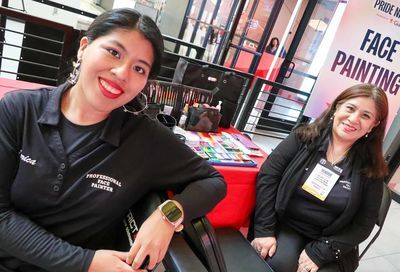L M Feldman Unearths Queer Roots with ‘Thrive, or What You Will’
"We have everything from prop plants to people as plants, because that's how I roll," says playwright Feldman.

L M Feldman thought she had hit a writer’s goldmine when she first heard about Jeanne Baret.
“Jeanne Baret was an 18th-century herbalist who, through a lot of improbabilities, ended up being the first woman known to circumnavigate the globe,” Feldman says.
“But she did it dressed as a man. As a gender-nonconforming female, I’m always sort of looking for stories — hero stories, journey stories, epic adventure quests — that center on someone who’s not a young boy or man. Because I didn’t have them growing up, and there’s some part of me that’s been unquenched for finding myself reflected in protagonists.
“I thought, ‘Wow, a sea-faring journey of this gender-crossing chick. It sounds great,'” Feldman continues. “And then I read the book, and I was like, ‘Oh, this is a really different story.'”
Upon reading Glynis Ridley’s 2010 biography The Discovery of Jeanne Baret, Feldman realized Baret’s story was a lot more complicated than initially appeared.
“We don’t have anything that exists from her, we don’t actually know what her experience was or what her motivations were, or how she identified. A lot of different relationships to gender, a lot of different reasons for the choices that she made, are possible. But we only have four records that have survived history, from four men who knew her — [and they] contradict each other.”
That made the challenge of how to write about Baret that much more interesting to Feldman. “As a playwright, I feel a hunger for trying to figure out how to connect to and unearth the buried stories of our marginalized ancestors, anyone whose story has been snuffed out,” she says, adding that, more often than not, we’re talking “women, queers, nonwhite anybodys.”
“The fact that her voice and her perspective and her identity are missing, ‘How could I tell a story about this person?'”
The answer can be found in Thrive, Or What You Will, a finalist this year for the Lambda Literary Prize for LGBTQ Drama and the winner in 2020 of the Shakespeare’s New Contemporaries project of the American Shakespeare Center, located in Virginia’s beautiful Shenandoah Valley, which is currently presenting the world premiere production of the show in rep with Shakespeare’s Twelfth Night.
Both productions feature the same six-person cast with a lot of intentional overlap. “Not just…in conversation with each other,” says Feldman, “but truly such that each play sparkles in the margins of the other play.”
In contrast to Twelfth Night, “Thrive doesn’t let, for the most part, any of [the gender crossing] be comic or romanticized, except for brief moments of spoofery and parody. Thrive really takes it as a given that people’s genders progress and evolve, and that there are many reasons for it. And so rather than making it a source of comedy and play, it becomes a source of investigation and truth and consequences…for people who are gender transformers.”
There’s also no single depiction or characterization of Baret.
“We ended up creating a play where everyone in the cast ends up playing the character,” Feldman says. “As they continue to change internally and be changed by the world, both, and reinvent themselves again and again, new actors play them. So that there isn’t a sense of, ‘This is the definitive Jeanne Baret.'”
To underscore that diversity in characterization, the cast is purposefully as diverse as possible across key demographics. “All of them sort of come together to tell the one story. So it’s more or less a chronological journey that starts before she went around the world to when she finally gets back to France.”
Baret is credited with helping discover and classify over 6,000 plants working as French naturalist Phillibert Commerson’s assistant, including the bougainvillea, which Baret likely discovered, but which was named after the captain of the expedition because, well, he had a penis.
In any case, a number of those plants do find their way into the production, in one way or another.
“We have everything from prop plants to people as plants, because that’s how I roll,” Feldman says. “There are definitely beautiful moments of highly imaginative, embodied things that are not literal but are incredibly evocative and symbolic and sometimes also very funny. Like people as plants.”
Thrive, or What You Will runs through August 7 in repertory with Twelfth Night in the Blackfriars Playhouse of the American Shakespeare Center, 10 S. Market St., Staunton, Va.
Tickets are $33 to $60. Call 877-682-4236 or visit www.americanshakespearecenter.com.
Support Metro Weekly’s Journalism
These are challenging times for news organizations. And yet it’s crucial we stay active and provide vital resources and information to both our local readers and the world. So won’t you please take a moment and consider supporting Metro Weekly with a membership? For as little as $5 a month, you can help ensure Metro Weekly magazine and MetroWeekly.com remain free, viable resources as we provide the best, most diverse, culturally-resonant LGBTQ coverage in both the D.C. region and around the world. Memberships come with exclusive perks and discounts, your own personal digital delivery of each week’s magazine (and an archive), access to our Member's Lounge when it launches this fall, and exclusive members-only items like Metro Weekly Membership Mugs and Tote Bags! Check out all our membership levels here and please join us today!























You must be logged in to post a comment.